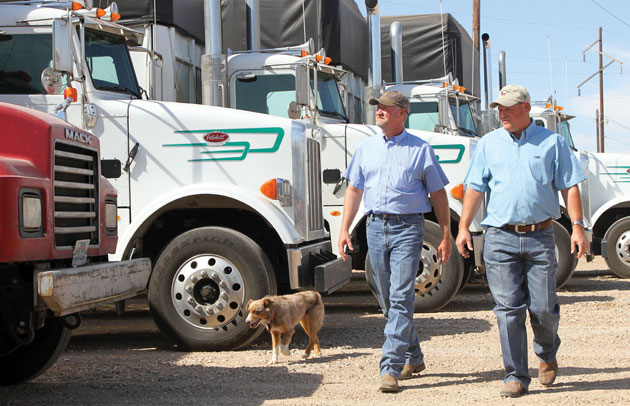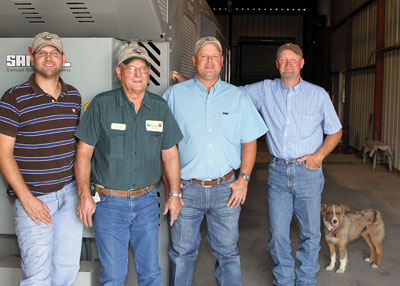
Floydada Co-op Gins Board Chairman Mark Beedy, left, and General Manager Aaron Hendricks survey the co-op’s new fleet of trucks.
Photos by Karl Wolfshohl
When Aaron Hendricks arrived at Floydada Co-op Gins on the Texas South Plains five years ago as the new general manager, he had his work cut out for him.
It was September of 2007, less than a month before the start of cotton ginning season in Floyd County, northeast of Lubbock. New top-quality equipment had been purchased and installed, but wasn’t operating efficiently. With harvest closing in, Hendricks, a fourth generation gin manager, had only enough time to make the most necessary improvements in operations. Other changes would have to wait.
But the improvements that he and the staff made then and continue to make today are literally paying off for the gin’s 204 members. In 2011, the toughest, hottest, driest year that most local farmers have ever endured, Floydada Co-op Gins was able to pay patronage to its members based on the year’s net income — in spite of a much-reduced cotton crop and bale count.
Efficiency Brings Profits
Gin profits are all about efficiency — number of bales ginned in an hour, a day and a season. And Hendricks was charged with improving the cooperative’s ginning efficiency as well as generating income in other areas.
“The gin was averaging 650 bales every 24 hours,” Hendricks recalls, “and now it’s over 1,000 bales every 24 hours.”
Such efficiency is achieved by making the most of labor in the harvest and ginning season, which usually runs from mid-October to the first of the year in this area.
Year-round, Floydada Co-op Gin normally has seven full-time employees, including Hendricks, but the staff swells to 60 to 65 in the ginning season, when truckers and other seasonal workers are hired. Regardless of the number of bales ginned, these employees are on the payroll. Simple math shows that the more bales ginned in this compact time period, the lower the cost per bale.
“Since we are a cooperative, when we are profitable, we return profits to the local community and its farmers, and the gin does the same thing.”
– Jeff Taylor, Vice President, Panhandle-Plains Land Bank
One of Hendricks’ first steps as general manager was to bring in his dad, Buddy, a veteran gin owner and manager, to manage the plant. Together, they tackled the next step, increasing throughput by adjusting air movement.
Ginning Cotton the Right Way
“All cotton is transported through a cotton gin using air,” Hendricks explains. “Once we got all the air and drying set up like it needed to be, then we could gin cotton like it needed to be ginned.”
Since that first season, the co-op staff has made additional major adjustments to air systems; improved their module feeder; boosted drying capacity by adding a second burner to the one that was already heating their hot-shelf dryer; made major improvements to their bale press; and added a new strapper and bagger to increase bales-per-hour output.
Now management and board members are considering increasing the ginning capacity of their four existing gin stands.
“We’re able to get the cotton in and through the gin in a timely manner. We average 55 bales an hour, and we can gin 60. If our customer base continues to grow, we’ll need to be at 70 or 75 bales an hour and we’ll have to spend more money to get to that point,” says Hendricks, who was reared in Floyd County.
New Trucks Bring New Business
But one of the biggest boosts to the gin’s bottom line has come from replacing old, worn-out trucks with new ones.
“We were having to hire a large number of modules hauled before Aaron came,” says Mark Beedy, chairman of the co-op’s board of directors. “Now that we’ve updated our fleet of trucks, we don’t hire any modules hauled. In fact, we haul modules for other gins. It increased our bottom line a lot last year — a lot.”
The modern trucks also have enabled the gin to take on other custom-hauling jobs and, perhaps even more important, have helped the co-op retain good employees by encouraging them to want to work there.
Reducing Gin’s Debt
Before Hendricks arrived, Floydada Co-op Gins — created through the consolidation of Farmers Co-op and Floyd County Co-op in 1972 — had borrowed money for capital improvements from Panhandle-Plains Land Bank in Plainview. One of Hendricks’ major goals has been to reduce the gin’s debt load. In five years, this goal has been accomplished in dramatic fashion. The debt has been slashed by nearly half through the time-tested principle of increasing income and cutting costs.
Because operating income has increased and most large capital improvements have been made, the gin has been able to cash-flow most of its recent improvements.
“We’ve got everything the way we want it now,” says Beedy, a Floyd County farmer. “The gin is efficient and modern. If we have something come along that we need, we can normally handle it.”
“But if we borrow any more money for large projects, it will be through Panhandle-Plains, because they’ve worked with us so well,” adds Hendricks. “They’ve taken care of us in terms of being there for us, and also because of the patronage. That’s a big deal.”
Patronage Is a “Big Deal”
Patronage is indeed “a big deal” from multiple viewpoints — for farmers who bring their cotton here, as well as for gin management and directors, as they choose lenders and processors.
Floydada Co-op Gins has managed to return patronage to members every year since 2007, not only because of operating efficiencies, but also because of the gin’s relationships with other co-ops and businesses, including Farmers Co-op Compress, Plains Cotton Cooperative Association (PCCA), Plains Cooperative Oil Mill and PYCO Industries cottonseed cooperative, as well as Panhandle-Plains Land Bank.

From left to right: Assistant Plant Manager Tanner Battey, Plant Manager Buddy Hendricks, General Manager Aaron Hendricks and Board Chairman Mark Beedy
“We get a share of everything — what the gin makes, what the oil mill makes, what the compress makes,” says Beedy, who has ginned most of his cotton here since he started farming on his own in 1984, and totally since Hendricks took over.
“With the loan we made them in 2006, the gin was modernized with a new press, new dryers and load-out area,” notes Jeff Taylor, vice president of Panhandle-Plains Land Bank and loan officer for the cooperative. “They really improved their bales per hour, and that’s made them more profitable.”
Strategic Business Decisions
Taylor, who has taken part in strategic business planning sessions with the co-op board, concurs with Beedy that new trucks have helped the co-op to retain good employees and avoid the challenge of finding, hiring and training new seasonal employees.
For Panhandle-Plains Land Bank and Floydada Co-op Gins, doing business together is a win-win relationship for them and the community.
“Since we are a cooperative, when we are profitable, we return profits to the local community and its farmers, and the gin does the same thing,” Taylor says. “That helps communities survive.”
Taylor says patronage isn’t necessarily “huge for the individual, but when you amass them together, it’s huge for these communities.”
Floyd County seems to have produced more than its share of leaders in agriculture. One of them is Eddie Smith, PCCA board chairman, and a former chairman of the National Cotton Council. Smith, his father and his son farm together here. Their cotton goes to Floydada Co-op Gins for ginning, and they do business with Panhandle-Plains Land Bank.
“I gin at the Floydada co-op because I can be a part of the operation as a stockholder, and we share in profits of the gin,” Smith says. “I’m very proud of the organization and how it’s evolved since we hired Aaron, with his ginning and management skills. I appreciate the cooperative mode of business.”
– Karl Wolfshohl